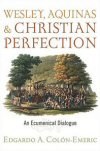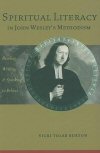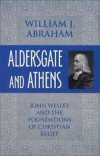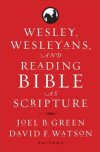Baylor Wesleyan Studies Collection (4 vols.)
Digital Logos Edition
Overview
Study the immensely important movement of Wesleyanism and its founder, John Wesley—one of the most influential figures in modern Christianity, North American Christianity in particular. This collection from Baylor offers essential reading for those wanting to understand this tradition and how it relates to past and present Christianity. In Wesley, Aquinas, and Christian Perfection, Edgardo A. Colón-Emeric presents Wesley’s view of Christian perfection as complementary to the theology of Aquinas and an ecumenical bridge between Wesleyan and Roman Catholic traditions. In Spiritual Literacy in John Wesley’s Methodism, Vicki Tolar Burton argues that female and working-class intellectual and social empowerment was a central aspect of Wesley’s Methodism, often overlooked or denied by Wesley scholars. William J. Abraham, in Aldersgate and Athens, focuses on the philosophical aspects of Wesley’s theology by considering his epistemological framework. Finally, in Wesley, Wesleyans, and Reading Bible as Scripture, Joel B. Green and David F. Watson bring together an impressive group of scholars in a valuable volume on Wesleyanism covering major approaches to Wesleyan studies, as well as the contemporary Wesleyan tradition.
The Logos Bible Software edition of these volumes is designed to enhance your study and understanding of theological issues and traditions. Scripture passages link directly to your English translations and original-language texts, and important theological concepts link to dictionaries, encyclopedias, and a wealth of other resources in your digital library. In addition, you can perform powerful searches by topic and find what other authors, scholars, and theologians have to say about John Wesley and Wesleyanism.

Key Features
- Current scholarship on John Wesley and Wesleyanism
- New perspectives on central components of the Wesleyan tradition
Product Details
- Title: Baylor Wesleyan Studies Collection
- Publisher: Baylor University Press
- Volumes: 4
- Pages: 1,213
Individual Titles
- Wesley, Aquinas, and Christian Perfection by Edgardo A. Colón-Emeric
- Spiritual Literacy in John Wesley's Methodism: Reading, Writing, and Speaking to Believe by Vicki Tolar Burton
- Aldersgate and Athens: John Wesley and the Foundations of Christian Belief by William J. Abraham
- Wesley, Wesleyans, and Reading Bible as Scripture edited by Joel B. Green and David F. Watson

Employing fresh, innovative readings, Edgardo Colón-Emeric examines and underscores the centrality of the concept of perfection for the theologies of Thomas Aquinas and John Wesley—and finds them, surprisingly, largely complementary.
Utilizing the image of a “kneeling ecumenism,” he offers a practical account of how ecumenical conversations can move forward. At a time when many Methodists struggle to understand Catholicism and many Catholics know little of Wesley and Methodism, this stimulating work provides the church as a whole a communal grammar of holiness, in demonstrating how the theologies of perfection of Aquinas and Wesley have significant messages for both groups.
Colón-Emeric brings together figures from disparate traditions, examines their thought fairly and judiciously, and offers comparisons that are truly illumining.
—Joseph Wawrykow, associate professor of theology, Medieval Institute, University of Notre Dame
Edgardo Colón-Emeric has written a critically important work on Wesley that rightly shows him to be a theologian ensconced in the Catholic tradition rather than the tired and well-worn interpretation turning him into a modern thinker preoccupied with epistemology. He shows us Wesley with proper proportion through a compelling examination of the doctrine of perfection and its ecclesial significance in Wesley and Aquinas. He offers the brilliant metaphor that Wesley’s theology represents a ‘house’ fit within Aquinas’ ‘cathedral.’ His work is beautifully written, logically developed, and the conclusions are convincing. It is a must read.
—D. Stephen Long, professor of systematic theology, Marquette University
This study will not only be useful for the technical analysis it gives to a significant aspect of Methodist and Catholic witness to the common tradition, but it will also provide a stimulus for further studies verifying the agreement claimed in the Joint Declaration and potentially enriching the sharing of a spiritual life to which both Wesley and Aquinas were committed in their own time and historical contexts.
—Jeffrey Gros, Journal of Ecumenical Studies
Edgardo A. Colón-Emeric (PhD, Duke University) is assistant research professor of theology and Hispanic studies, Duke University Divinity School

Vicki Tolar Burton argues that John Wesley wanted to make ordinary Methodist men and women readers, writers, and public speakers because he understood the powerful role of language for spiritual formation. His understanding came from his own family and education, from his personal spiritual practices and experiences, and from the evidence he saw in the lives of his followers. By examining the intersections of literacy, rhetoric, and spirituality as they occurred in early British Methodism—and by exploring the meaning of these practices for class and gender—the author provides a new understanding of the method of Methodism.
Through close examination of primary sources, Tolar Burton offers a rich account of leading Methodist women such as Sarah Crosby, Mary Fletcher, and Hester Ann Rogers . . . Historians of early Methodism should regard her study as essential reading.
—Barry W. Hamilton, professor of historical and contemporary theology, Northeastern Seminary
Here is the counter history to the elitist rhetoric of Hugh Blair and George Campbell. Vicki Tolar Burton’s close reading of the actual day-to-day texts of early Methodism’s founder and followers expands our knowledge of how a democratizing rhetoric gave cultural voice to women and to working class men in early Methodism.
—Robert Stephen Reid, chair, Communication Department, University of Dubuque
Spiritual Literacy illumines an underappreciated aspect of the Methodist movement—John Wesley’s concern for the literary abilities of ordinary citizens.
—Randy L. Maddox, professor of theology and Wesleyan studies, Duke University Divinity School
Vicki Tolar Burton (PhD, Auburn University) is associate professor of English and director of the Writing Intensive Curriculum, Oregon State University.

In his day, John Wesley offered important insights on how to obtain knowledge of God that readily bears fruit in our own times. As premiere Wesleyan scholar William Abraham shows, Wesley’s most famous spiritual experience is rife with philosophical significance and implications. Throughout, Abraham brings Wesley’s works into fruitful conversation with some of the most important work in contemporary epistemology. Lyrically and succinctly, he explores the simultaneous epistemological quest and spiritual pilgrimage that were central to Wesley and the Evangelical revival of the eighteenth century. In so doing, he provides a learned and eye-opening meditation upon the relationship between reason and faith.
Abraham draws fascinating lines between Aldersgate and Athens that few could have imagined existed. Priority reading for philosophers of religion.
—Jerry L. Walls, professor of philosophy of religion, Asbury Theological Seminary
This is Abraham at his best. His thought-provoking comments throughout will engage the serious reader for years to come.
—Richard P. Heitzenrater, The Divinity School, Duke University
William J. Abraham ... has given us a slim but rich volume on the epistemology he believes is extractable from Wesley’s experience.... Abraham has done us all a favor by clearly and concisely organizing and arguing the evidence of Wesley’s theological epistemology. The case he builds comes from a close reading of the text, and by bringing Wesley into conversation with modern philosophers of religion he has shown the continued relevance of this great evangelist and modern saint.
—Tony Hunt, The Living Church
[Aldersgate and Athens] encourages believers to look less to a reasoned faith proportionate to the objective (external or public) evidence for theism and more to a faith which generates its own certainty in the encounter with God in revelation and experience.
—Graham Gould, The Journal of Theological Studies
William J. Abraham (DPhil Oxford University) is Albert Cook Outler Professor of Wesley Studies, and Altshuler Distinguished Teaching Professor, Southern Methodist University, Perkins School of Theology. He is the author or editor of 16 books, including Canonical Theism: A Proposal for Theology and the Church (with Jason E. Vickers and Natalie B. Van Kirk), Crossing the Threshold of Divine Revelation, and Canon and Criterion in Christian Theology: From the Fathers to Feminism.

The theology of John Wesley has proven exceedingly influential in the religious and spiritual lives of Wesley’s followers and his critics. However, Wesley did not leave behind a written doctrine on Scripture. This collection presents an array of diverse approaches to understanding John Wesley’s charge to read and interpret the Bible as Scripture. Contributors move beyond the work of Wesley himself to discuss how Wesleyan communities have worked to address the difficult scriptural and theological conundrums of their time and place.
With contributions from William J. Abraham, Justo L. González, Joel B. Green, Elaine A. Heath, Randy L. Maddox, Laceye Warner, and Robert W. Wall, Wesley, Wesleyans, and Reading Bible as Scripture ultimately attempts to underscore what it means to stand in the Wesleyan stream and bring about holiness through—and within—daily occurrences.
Every renewal of the church has been ignited by a renewed encounter with Scripture. Who better to provoke a fresh encounter than John Wesley, ‘man of one book’? Green and Watson have assembled an exciting, Wesleyan encounter with Scripture in this wonderful book. Quite a gift for the renewal of the church.
—Will Willimon, professor of the practice of Christian ministry, Duke Divinity School
Green and Watson are superb scholars who have assembled an excellent array of diverse contributors. The role of Scripture in the Wesleyan theological tradition is more often assumed than examined, and this insightful book will go a long way toward correcting that deficiency.
—William B. Lawrence, professor of American church history, Perkins School of Theology, Southern Methodist University
Joel B. Green is professor of New Testament interpretation and associate dean for the Center for Advanced Theological Studies at Fuller Theological Seminary. He is an award-winning author or editor of more than 30 books including the Dictionary of Jesus and the Gospels and the Two Horizons Commentary on 1 Peter. He also serves as teaching pastor at La Cañada United Methodist Church.
David F. Watson is academic dean and associate professor of New Testament at United Theological Seminary. He is also the author of Honor Among Christians: The Cultural Key to the Messianic Secret.
Reviews
3 ratings

Scott J Sherwood
5/23/2016

Allen Bingham
3/18/2014

Michael Chapman
10/19/2013
I have found the Baylor Wesleyan Studies collection to informative and wonderful in insight to my studies in Wesleyan tradition.